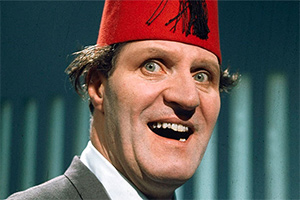
Tommy Cooper
- Welsh
- Comedian and magician
Press clippings Page 13
In part two of the terrifically enjoyable The Story of Variety, presenter Michael Grade investigated television's culpability in killing off variety, and highlighted the attempts of various performers to make the tricky transition from stage to screen.
Tommy Cooper adapted instinctively, Morecambe And Wise succeeded on their second attempt, while Ken Dodd never quite succeeded in shrinking his genius to television's proportions. Ventriloquist Peter Brough and his doll Archie enjoyed tremendous, if inexplicable, popularity on the radio, but a clip from the archive showed why they never enjoyed small-screen success - Brough had failed to grasp a fundamental element of ventriloquism and made little or no effort to disguise his moving lips.
Harry Venning, The Stage, 14th March 2011This second exploration of showbiz is a tale of those who could play to the camera, instead of the audience. Ken Dodd shows how he's torn between the two. Others did not face the same dilemma - witness Morecambe and Wise's mastery of the medium. For the other modern great, Tommy Cooper, we learn performances were meticulously planned. But in 1984, with alternative comedy booming, both Tommy and Eric died. But variety didn't die with them. We have Britain's Got Talent. And now ITV has bought the rights to the Royal Variety Performance. That wouldn't have happened had Grade been back at the BBC.
Geoff Ellis, Radio Times, 7th March 2011Is this the funniest woman in Britain?
She's as comedic as Tommy Cooper and as hilarious as Hattie Jacques. Now Miranda Hart has won the affections of Allison Pearson.
Allison Pearson, The Telegraph, 8th December 2010Tommy Cooper dominates list of best jokes
Heard the one about two aerials meeting on a roof, falling in love, and getting married? The ceremony was rubbish but the reception was brilliant.
Peter Hutchison, The Telegraph, 21st October 2010Review Stephen Fry Live
What the show needed was an infusion of punchlines. Only at the end did he unleash two worth the name, and they were both Tommy Cooper's.
Stuart Jeffries, The Guardian, 22nd September 2010"Huh, huh, huh, huh," is the first thing you hear, the unmistakeable laugh of Tommy Cooper, comedian, magician, a man so funny that you just had to see him to start laughing. Eric Morecambe wouldn't go on the stage after him, says Barry Cryer, one of the many stars who line up here to remember a unique giant of light entertainment. He died in 1984 but memories of him are still vivid. His humour wasn't in the joke, says producer Royston Mayoh, but the delivery of it, and it lives on today through the internet. Sean Lock, comedian, presents.
Gillian Reynolds, The Telegraph, 21st July 2010The main source of the comedy in Miranda is that she is a human stegosaurus, huge and hugely unfanciable, which as others have noted is politically not very correct. And if political incorrectness isn't reason enough on its own to love Miranda, there are plenty of other reasons, not least, in our house anyway, that it is the first new primetime sitcom I can recall that unites the whole family, all laughing our socks off. The hugely engaging Miranda Hart also deserves a medal, or better still a Bafta, for reminding us that slapstick can be funny. Not an episode goes by without her tripping over something, or getting stuck in something, which in less assured hands would be justification for throwing a heavy object at the telly, but it takes real deftness to appear as galumphing as that. She might even be the reincarnation of Tommy Cooper. At any rate, she deserves to have her name in the title.
Brian Viner, The Independent, 8th December 2009Spoon, Jar, Jar, Spoon Review
In the end, as with most great humour, it's impossible to pin down why Cooper was funny, and Brydon didn't try. I guess that's part of the beauty of humour - there's no point in analysing it.
Chris Maume, The Independent, 19th April 2009Spoon, Jar, Jar, Spoon - The Two Sides of Tommy Cooper (Radio 4) was a great idea, looking at the comedian as a magician in particular. In its portrayal of London's specialist magic shops in the 60s and 70s, many of which were effectively private clubs for magicians, it was especially evocative.
"For a high-profile star like Tommy," said presenter Rob Brydon, "magic shops were a tantalising place to hide." Brydon went on to mention "the relaxed atmosphere, the comfy sofas, and cocktails from the small bar", all of which provoked a peeved cackle from contributor Paul Daniels. "I don't know about the cocktails," he laughed, sounding a bit stung. "I was never offered one." And those comfy sofas he pointedly remembered simply as "settees".
When the programme stuck to this angle, and resisted general assessment of Cooper, it added something new to our understanding of him. I liked hearing that he got his first magic set at the age of eight from his Aunt Lucy, and how magic-shop owners would teach and sell Cooper tricks that he then took to huge audiences. "His trick," observed Brydon sagely, "was to make magic look complicated, but entertaining look simple."
Elisabeth Mahoney, The Guardian, 15th April 2009The title refers to one of Tommy Cooper's favourite tricks. But there's a subtitle to this portrait of a much-loved comedian, The Two Sides of Tommy Cooper, reflecting Cooper's fascination with the craft of magic as well as his genius for turning an apparent failure at it into a great stage act. We hear (as you may have gathered from the incessant trailers) from other stage magicians about how serious you have to be about the business to turn it into laughter. Discover the people and places where magic is a trade. Rob Brydon presents.
Gillian Reynolds, The Telegraph, 14th April 2009